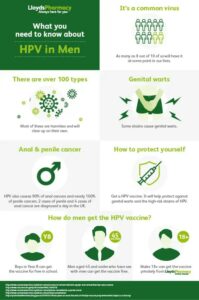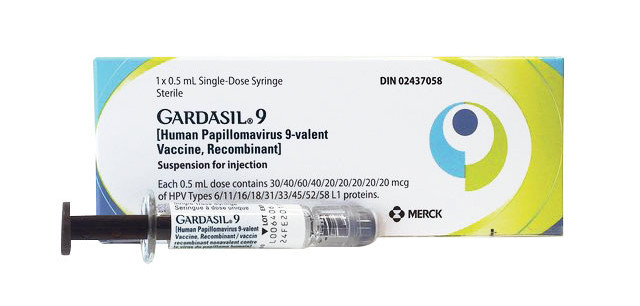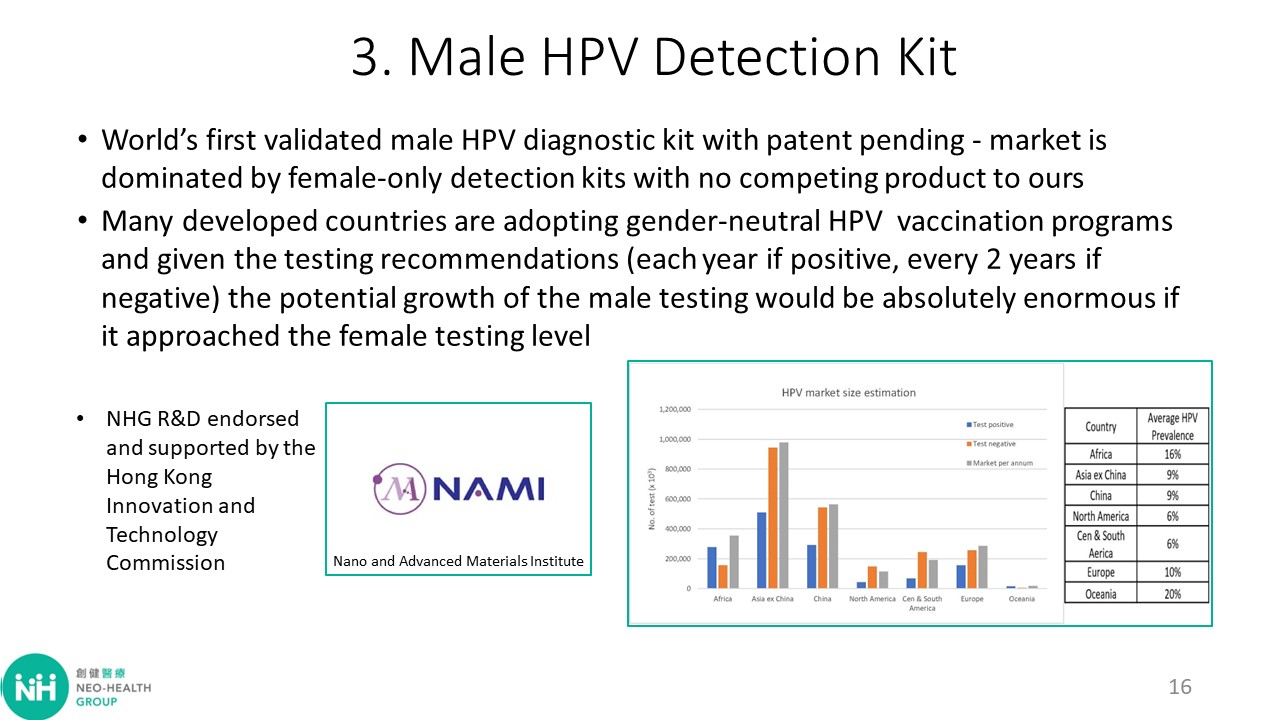Welcome to the viewers of SEIML Ventures, and to this monthly series with Dr. Francois Fong of NeoHealth Group in Hong Kong, which deals with issues related to sexual health. We hope it will contribute to public education about sexual health and help viewers, both women and men, learn about prevention and treatment for the benefit of their own health. Today’s topic is HPV and men.
Script of Interview
Interviewee Dr. Francois Fong (FF)
Position Managing Director
Company name Neo-Health Group (‘Neo-Health’)
Company website https://www.neohealth.com.hk/
Interviewer John D. Evans, CFA (JE)
Interview conducted on 9 July 2022
Script
JE Okay, welcome to the viewers of SEIML Ventures, and to this monthly series with Dr. Francois Fong of NeoHealth Group in Hong Kong, which deals with issues related to sexual health. We hope it will contribute to public education about sexual health and help viewers, both women and men, learn about prevention and treatment for the benefit of their own health. Today’s topic is HPV and men. Welcome back Francois.
FF Hi John
JE Okay, let’s kick things off. In January of this year, you’ve talked about HPV in general. I take a note from you from that script. And it says quote: “I think for HPV alone, people still have a belief that it’s a woman’s disease”, unquote. Explain what you mean by that, and what the implications are.

FF I think for many years, the education on HPV has been focused on women in relationship to cervical cancer. So, in terms of awareness, women are much more aware of HPV compared to men. And the vaccine initially been around for more than 10 years now had been promoted to particular to women and girls. So, the awareness for vaccine against HPV is also pretty well known among the women. And men still, many of them do not even believe that they are even know that they would be a carrier for HPV, and also they could be vaccinated against.
JE So, what are the medical implications of HPV and are they serious for men?

FF There are two issues for men. Number one, most of the women who got the infection actually got it from the male sexual partners. So, for male, they’re a carrier for HPV, they can infect their female partners. So that’s a source of infection. And secondly, for male, although male penile cancer is much smaller, compared to cervical cancer in women, they still can potentially be infected with HPV and causing anal cancer, throat cancer and penile cancer.
JE Okay, so it’s potentially a serious health issue for a man not just a woman, irrespective of the spread risk. Okay. What is the current situation for men and HPV? What is the situation do they get tested regularly? Are many starting to get vaccines, what is the current state of play?
FF Well, we looked at one recent study in Hong Kong that was done by Family Planning Association, and it shows only 1% of the boys been vaccinated against HPV. So, the awareness for HPV among males that’s been in the boys is very poor. Many of the males do not know that they could be tested for HPV. Because the initial testing for HPV are focused on women and the type of test in particular for female vaginal cells or cervical cells, for male, the sample collection is a lot more difficult and the amount of cells that could be collected will be much smaller. So, we have devised a different protocol for testing male compared to female and so we’re probably the only real center will be in testing for men for more than 10 years now. And we’re about to launch our commercialized kit, particularly for male HPV.
JE So, if the lack of focus on male HPV is a problem. And I guess it’s at the institutional level because a lot of lot of health goes through government programmes in many countries. What specifically needs to be done in a broad sense. We’ve talked about the sampler but presumably there’s other issues and policy issues that need to be considered.
FF I think in terms of policy, we need to recognize that males are a major carrier for HPV. And from many countries study around 60 or 70% of males could be carrier for HPV. And when they are sexually active, and they will be a carrier and passing on to women. So, if we do not stop this source of infection, we can never achieve zero cervical cancer. And recently, we also see a lot of women already had the HPV vaccination against the major types of HPV, but there seems to be a trend to shift to different types and the lesser, previously lesser common types are now becoming more common. So, I think like the Covid virus, so the vaccine alone will not be the only strategy used.

JE Okay. Now, you mentioned a little bit about testing, but what exactly is NeoHealth planning to address all of these issues?
FF Well, I think there are number areas we can target. Number one, to better understanding the implication and the spread of HPV in male, we need to first have a more reliable testing and also a standardized method in testing male. Once we can achieve that, then secondary, apart from having vaccine for male, we can also potentially devise different treatments. And once again, we can only devise or compare different treatments, when we have a standardized HIV test to compare before and aftereffects. Otherwise, it will not be able to achieve a randomized control trial.
JE Okay, so the development of testing and diagnostics is absolutely key. Now you’ve got a specific programme in place to address this. Tell us a little bit about the details of it, when it might be expected to appear on the market and where you will originally make it available. Is it Hong Kong only? Give us a bit more of the details?

FF Well, our programme has divided into a research programme has run in two parts. The first part is to standardize the sample collection method in male. Currently, there is no standardized methods. So, some study they will collect HPV sample from male urethra and opening, some will collect from urine sample and some would collect from parts of the skin. So, what we find is the most reliable and sensitive method is to actually have multiple sites collections on the shank of the penis, the base of the penis, around the foreskin and also the head of the penis. When you have multiple sites, the reliability of collecting enough cells is tremendously increased. And we should be able to achieve like 99% plus a good sample, in doing that. However, the method can be a little bit more refined in a way. So, we’re developing a male sampler, which can be used by the patient himself, or by a technician to collect samples and collect enough cells for testing. And then the second part is to have a PCR kit that is sensitive enough to perform tests on the sample. So, once we have the standardized sample collection methods, then we can compare and optimize our male PCR testing. For the time being our expected time is we should be able to commercialize it probably in Q3 of 2023.
JE OK, so in about one year’s time, we may be able to see this on the market. I would also guess from what you said at the very beginning, that that when you release this new test and diagnostics, there will have to be a lot of education and public awareness to get people to start using the test because lack of awareness seems to be at least on men and public health officials seems to be a big issue.
FF That’s right. And from patient that we see, a lot of them may be looking at and find information from the internet. A lot of the information still says there’s no male specific kits for HPV. But that’s not really true. Technically speaking, we don’t have an FDA approved male testing kit for HPV. But as in many tests, FDA takes many years to approve anything to be standardized. So, in Europe, for example, a lot of the tests we can find in European country a lot faster, or earlier than having the same test in America. So, our first target is to have our reagent kits with CE certification. So, which will cover most of the world usage.
JE OK, so you’re looking at a much broader distribution of the male testing, along with a good programme to introduce it to the market and the importance of all of the things we’ve talked about today about men and HPV. So, thank you very much for that. That’s very interesting. It’s always something that’s good to follow and we seem to be in a period of time right now, where there’s a lot of things on the health front being recognized and looked at. It’s not just about COVID. There’s a lot of other important issues, and men and HPV seems to be one of them. So, thank you very much for your time today. Francoise. Thank you very much.
FF Thank you, John
End.
If you have thought of operating a business in Asia, or already have one, then do not hesitate to contact us to see how we might be able to help you set up, raise private capital, and manage your company’s local administration.
©2024
Add Your Heading Text Here

Benny has worked in the financial markets of China with an emphasis on fixed income, currency and asset-liability management. He is currently Vice President of Longly Capital, a medium-sized, Ningbo-based private fund management company. The firm’s strategies include various types of fixed income portfolio management and convertible bond portfolio management. In addition, Benny offers financial investment services to professional investors such as Fund of Funds (FoF) of securities companies, enterprise investors and high net worth (HNW) individuals.
Benny has also been active on the commercial side of the securities business managing client business development strategies, marketing programmes and roadshows and developing and delivering financial markets training programmes for small and medium-sized banks and other financial institutions.
Benny is fluent in Mandarin, English and Japanese.

Since returning from graduate studies in France to China in spring of 2014, Jina has been continually working in the field of e-commerce and its applications to the financial, entertainment and automotive industries. She is a multi-functional talent and fluent in Mandarin, English and French.
Jina is SEIML’s key relationship manager between foreign clients and the Chinese administrative authorities and has held many responsibilities dealing with international companies and executives operating in China. As a result, she manages all of the company’s Business Process Outsourcing (BPO) activities with clients
With her graduate degree in economics and completion of the Investment Foundations certificate from CFA Institute, she has the knowledge to assist foreign companies in China market research, including reviews of potential customers, suppliers or other third parties. She is also quite savvy in the use of Chinese social media.
Jina is fluent in Mandarin, English and French.

John spent the first 24 years of his career in investment banking, first in Toronto, briefly in New York and then London. He was involved in DCM, ECM and strategic investment advisory to large funds in EMEA.
In 2004 he moved into academia and designed and ran MSc programs in investment management at universities in the UK and China. He also created and managed one of the larger financial professional training organizations in Europe while at the UK university (that was a JV partner in the training firm).
In 2016, John returned to industry to work with start-ups and various platforms and eco systems to support these early and middle stage companies. Initially he pursued this venture in the Shanghai region but then moved to Hong Kong in 2024 to build SEIML’s footprint in Southeast Asia. John is also a Director of the Hong Kong Founder Institute (FI) eco system and Program Director for the FI ASEAN Fintech accelerator.